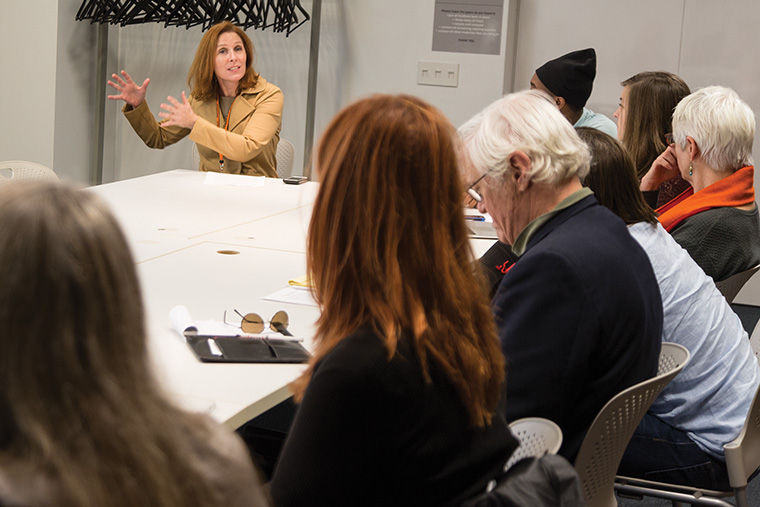Strategic Plan committees off and running
Senior Associate Provost of Academic Affairs Suzanne Blum Malley addressed the Integrated First-Year Experience committee Oct 21.
October 26, 2015
The Strategic Plan implementation committees have received their assignments and will begin working on their first-year goals, according to Senior Vice President and Provost Stan Wearden.
As reported Oct. 5 by The Chronicle, the committees—which include the Universal Learning Outcomes, Columbia Core, Integrated First-Year Experience, Registration and New Student Orientation and Community Engagement committees—will each focus on implementing a part of the Strategic Plan.
Wearden, who is the chair of the Universal Learning Outcomes Committee, said an additional committee related to the college’s commitment in the Strategic Plan to diversity, equity and inclusion will eventually be added.
“That is a committee the president wants to take some time to think about,” Wearden said. “It is important to realize there will be pieces of the diversity, equity and inclusion conversation in all of these committees.”
Wearden chose committee members after representatives for part- and full-time faculty, staff and students volunteered for specific committees, he said.
Wearden met with each of the committees throughout a two-week period from Oct. 6–21 to discuss each committee’s goals.
The Universal Learning Outcomes committee, which met on Oct. 6, plans to draft education-related goals for revising the college’s core curriculum by Dec. 15.
“It is a natural step in the evolution of Columbia College Chicago,” Wearden said. “It was important we establish a strong liberal arts core, and we have done that. Now it is important to take that next step. It is a step that a lot of institutions are taking right now to rethink the core and make sure the core is sufficiently broad and covers the key aspects of being an educated adult.”
Steven Corey, interim dean of the School of Liberal Arts & Sciences and the chair of the Columbia Core Committee, said he met with his committee Oct. 12 to discuss its goal of proposing a new core by May 27, 2016, based on the recommendations made by the Universal Learning Outcomes Committee.
“When we receive the universal learning outcomes, we will begin deliberations on how to build a core [around those outcomes],” Corey said. “We want to make sure our curriculum is providing students an education for the 21st century.”
The committee met to discuss its goal of developing plans and recommendations for improving resources and courses available to new students, said Suzanne Blum Malley, senior associate provost of academic affairs and chair of the Integrated First-Year Experience committee.
Blum Malley said her committee will tap into internal expertise and researching, and assess data compiled from the Big Chicago courses and various student and alumni surveys. The committee will also look at what other institutions are doing to ensure the best recommendations for moving forward.
Blum Malley added that a student’s decision to continue at Columbia may hinge on a number of factors, but the first-year experience tends to play a crucial role.
“That experience, in terms of having a valuable learning and social experience early in their initiation into college life, tends to be a portion of the deciding factor of whether a student stays to continue their studies and eventually [earn] a degree,” she said.
Keri Walters, assistant provost of Academic Services, and Jeff Meece, associate vice president of Enrollment Management, are the co-chairs of the Registration and New Student Orientation committee, which met Oct. 21.
The committee will revise new student services and present a proposal by May 26, 2016.
“There was a committee similar to ours that did work last year,” Meece said. “A starting point for us is to review what they did and get the results of their work.”
Communication between the various offices that new students work with is an important part of improving the new student experience, Walters said.
“Offices are going to remain as their own centers,” Walters said. “There is a way to bring all of the information together so that it is a one-stop experience in terms of the service to the student.”
The committee will work closely with the First-Year Experience Committee to achieve the Strategic Plan’s student success goals, Walters said.
The Community Engagement Committee met with Wearden Oct. 16 and will work to achieve two goals during the 2015–2016 academic year, according to Pegeen Quinn, the associate provost for Academic Personnel and a co-chair on the committee. The goals are to create a working definition of community engagement at the college and to conduct a collegewide survey of community engagement activities, Quinn said.
“[Community engagement] keeps us connected to our local community so we can learn from others,” Quinn said. “Chicago is such a rich, large community, and it is exciting to think of all the relationships and connections that we can make.”
The committee has split into two subcommittees, Quinn said. Tim Cozzens, chair of the Design Department, will head the sub committee that will develop the definition of community engagement, and Quinn will head the subcommittee that will conduct the collegewide survey.
“To have the next step of implementing collegewide engagement around this notion, we have to a have an agreement on what we are doing,” Cozzens said. “[The definition] will evolve over time.”
Cozzens said the support these committees have received from the college community has been encouraging for the future.
“A lot of times, committee work can be seen as dry and not something you really want to do, but there has been so much positive support throughout the entire college community around the strategic implementation,” Cozzens said.
The committees allow the whole college to be involved in Strategic Plan implementation, Wearden said.
“The only way we can accomplish the goals is if we do it collectively as a college,” Wearden said. “It is important to have people from across the college work on these [goals] and formulate plans for how we are going to
implement them.”








